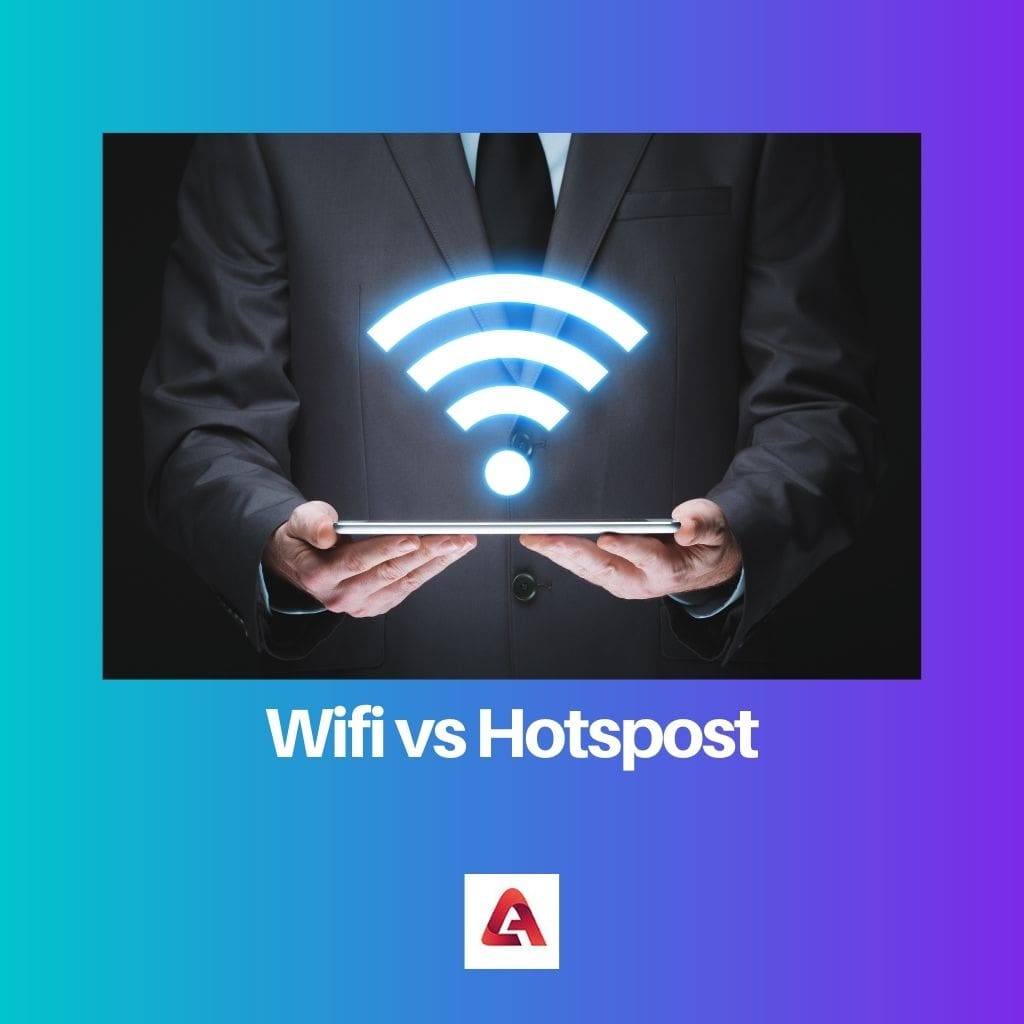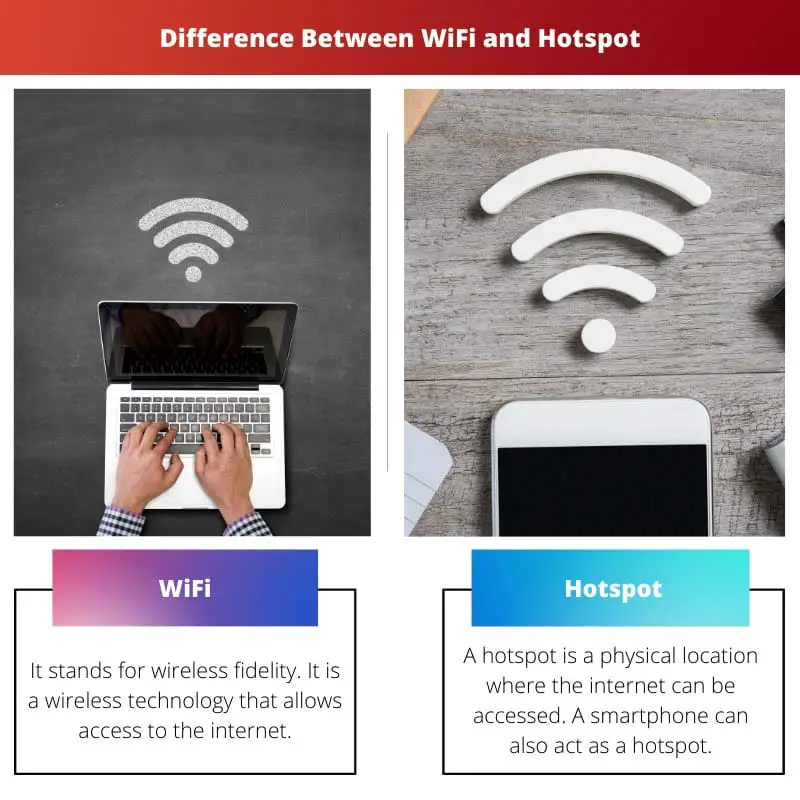The data subscription plan provided by the Internet Service Provider is not the only option for accessing the internet today. Our smartphone offers many other ways to share and access the internet.
We can share our internet connection with nearby devices using wifi and Bluetooth hotspots. Although wifi hotspot is a commonly used term, there are significant differences between wifi and hotspot.
Key Takeaways
- Wi-Fi is a wireless networking technology that enables devices to connect to the internet or communicate with one another without physical cables, using radio frequencies.
- A hotspot is a physical location or device that provides internet access to Wi-Fi-enabled devices, such as smartphones, laptops, and tablets, through a wireless local area network (WLAN).
- While Wi-Fi refers to the technology itself, a hotspot is a specific application of Wi-Fi technology allowing multiple devices to access the internet through a single connection point.
WiFi vs Hotspot
Wi-Fi is a wireless networking technology that allows devices to connect to the internet or a local area network wirelessly, using a router or access point. A hotspot is a specific location where a wireless network is created by a device, such as a smartphone or a dedicated hotspot device.

Wifi stands for wireless fidelity. It is a set of protocols to access the internet without wires.
Its range is limited to a local area network (LAN).
A hotspot is a physical location that identifies a local area network. It creates many wireless access points for the users.
These points can then be accessed using the wifi or Bluetooth of a network device.
Comparison Table
| Parameter Of Comparison | Wi-Fi | Hotspot |
|---|---|---|
| Definition | It stands for wireless fidelity. It is a wireless technology that allows access to the internet. | A hotspot is a physical location where the internet can be accessed. A smartphone can also act as a hotspot. |
| Type | It is a family of protocols. | It is a physical location. |
| Provided By | Provided by the Internet Service Provider. | Provided by corporations and places such as hotels, libraries, etc. |
| Security | It is more secure. | It is less secure. |
| Expense | Generally, a fee has to be paid to access the internet. | Several corporations provide it for free. |
What is WiFi?
Wifi stands for wireless fidelity. It is based on the IEEE 802 protocol family.
It provides clients in a Local Area Network with internet access.
Almost all devices nowadays are equipped with wifi support. We can access wifi on our smartphones, laptops, tablets, and computers.
The wifi technology uses a 2.4 GHz Ultra-High Frequency radio band. Due to obstructions such as walls and doors, the range of wifi is affected.
We can set up a wifi hotspot by allowing our smartphone to share its internet. On a small scale, this includes connecting one or two devices to our phones with password protection.
Today, wifi provides data transfer speeds up to 1 Gbit/s. Since it is more vulnerable to being hacked, it is protected using Wi-Fi Protected Access.
Wifi has an extra advantage over wired Ethernet. It can be used in places where cables cannot be laid down.
Wired Equivalent Privacy (WEP) was initially designed to protect wifi networks. However, its vulnerability led to the Wi-Fi Protected Access (WPA) design.
Also, Virtual Private Networks (VPNs) effectively keep the data safe in a public wifi network.

What is Hotspot?
A hotspot is a physical location characterized by a network device that provides internet access to clients. A hotspot may be wireless or wired.
It uses wifi as the protocol and routers as network devices to provide internet access to devices in a Wireless Local Area Network. However, wifi is not the only option.
Bluetooth and USB cables can also be used to share the internet connection. In this case, the device is said to tether.
There are two types of hotspots based on the traffic of clients. These are public hotspots and private hotspots.
Public hotspots are created using Wireless Access Points (WAPs) and routers. They are set up by hotels, libraries, and other organizations to provide services to visitors.
A private hotspot is also called tethering. It is used to share the internet subscription of a smartphone with other nearby devices.
Tethering can be realized using Bluetooth sharing or a USB connection.
There are several security concerns associated with the hotspot. The wifi connection must be encrypted so that the hackers may not steal valuable data.
Also, the hotspot provider has access to the contents searched by the clients.
However, the popularity of hotspot access is quickly increasing among people. From 2012 to 2018, the hotspots worldwide have increased from 5.2m to 10.5m.

Main Differences Between WiFi and Hotspot
Wifi and hotspot aren’t the same. Wifi is a wireless method of connection to internet service providers. Hotspot is a setup that provides internet access.
Wifi is mainly used to set up a hotspot, although other technologies exist.
The main differences between the two are :
- Wifi stands for wireless fidelity and is a Local Area Network connection method. On the other hand, a hotspot is a device or location that provides internet access to single or multiple clients on a Local Area Network.
- Wifi is a set of protocols, whereas the hotspot is a physical location.
- Wifi is provided by the Internet Service Provider, whereas different corporations set up hotspots.
- Wifi is more secure as denying access to suspicious clients is easy. On the other hand, a hotspot is less secure as anyone within the range can access it.
- The higher cost is associated with accessing wifi from an ISP, whereas public hotspots are free.

- https://ieeexplore.ieee.org/abstract/document/8057096/
- https://www.albany.edu/~gc227838/ist523/How%20WiFi%20Works.pdf

The article’s coverage of the subject is extensive, providing invaluable insights into wifi and hotspots.
Indeed, it’s rare to come across articles that are both educational and engaging. This one strikes a good balance.
Absolutely, the depth of knowledge demonstrated by the author is commendable.
This article is very informative and provides a clear distinction between wifi and hotspot. Everyone should read it!
Very well-written article, the author is clearly knowledgeable about the subject.
I absolutely agree, it’s crucial to understand these differences in today’s connected world.
The author provides a comprehensive overview of the topic. It’s a must-read for anyone looking to understand the differences between wifi and hotspots.
Absolutely, the level of detail in this article is impressive.
I couldn’t agree more. This article is a valuable resource for anyone looking to expand their knowledge on the subject.
I find the tone of this article to be rather condescending, as if the readers are not already familiar with these concepts.
I can see where you’re coming from, but I think the author’s aim was to ensure clarity for readers of varying levels of familiarity with the topic.
I understand your perspective, but I believe the article was written with the intention of being as comprehensive as possible.
The distinctions drawn between wifi and hotspots are highly elucidative. This article has certainly enhanced my understanding of these concepts.
Agreed, it seems the author has delved deep into the subject matter to provide such a detailed analysis.
The comparisons made in this article are very insightful and provide a much-needed clarification on the distinctions between wifi and hotspots.
Absolutely, this article really sheds light on the key differences that many people may not be aware of.
The article definitely serves as an educational resource, but the tone borders on being overly didactic.
The detailed explanations and comparisons are commendable. The author has done a great job of presenting complex technical concepts in an accessible manner.
Absolutely, it’s refreshing to come across an article that doesn’t compromise on depth while maintaining accessibility.
I couldn’t agree more. This article truly serves to demystify the technicalities of wifi and hotspots.
An engaging read that adeptly navigates the technicalities of wifi and hotspots, shedding light on the finer nuances of each.
I find the style of writing in this article to be overly verbose and lacking conciseness. The points made could have been conveyed more succinctly.
I see your point, but I also appreciate the thoroughness with which the author has addressed the topic.
While verbosity is a valid concern, I believe the depth of information provided compensates for it.